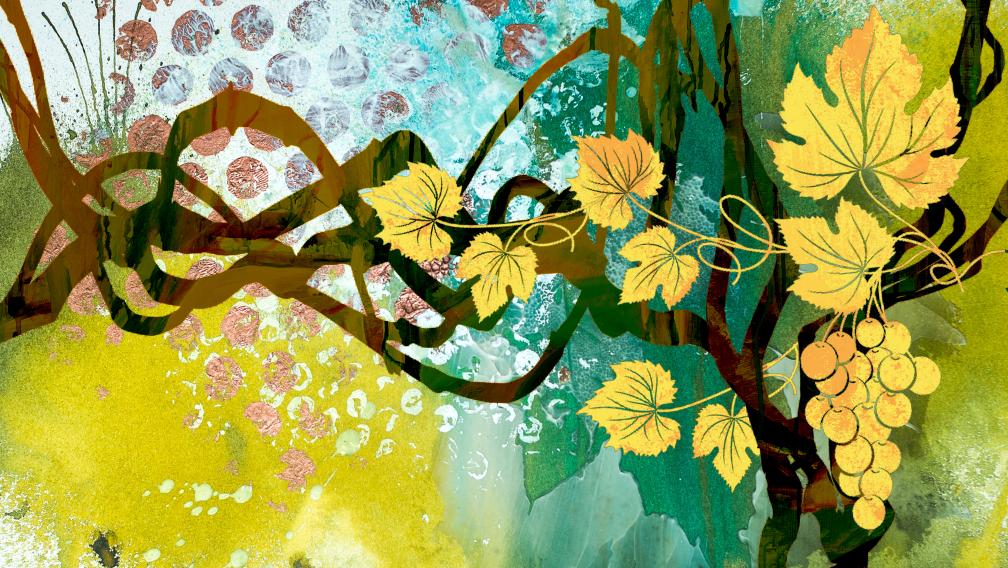Growing With God Can Be Uncomfortable

“‘I am the true vine, and my Father is the vinegrower . . . Every branch that bears fruit he prunes to make it bear more fruit.’” — John 15:1–2
A Look Ahead to Sunday’s Readings
Sunday’s reading from the Gospel of John is often referred to as a “farewell discourse” in which Jesus, nearing his death, prepares the disciples for his departure — leaving them, and the future church, with certain instructions and assurances. Understandably, the disciples are distraught. Jesus’s impending death ignites in them a genuine crisis of faith. But Jesus assures them, despite his departure, he will never abandon them. In fact, he explains, he is making way for a deeper intimacy.
Jesus at once evokes familiar metaphors from the Hebrew scriptures and the everyday experience of agricultural life all around the disciples: “I am the true vine,” he says. Describing his ongoing, life-sustaining support as that of a grapevine, he likewise compares the disciples to fruit-bearing branches and God to the gardener who tends them.
This organic imagery points to the promise of creative collaboration inherent in a relationship with God. Jesus says, “Abide in me and I will abide with you.” Make your home in me as I make mine in you. Live in me and I will live in you. The fruit of the Christian life — good works, union with God, and communion with one another — comes from God and grows in relationship with God. God does not want creatures who fearfully obey, but genuine friendship.
God is at work in us, producing every kind of good work and service. We do not do it alone, but in partnership with God.
How do we know God is a faithful friend? God’s faithfulness can be seen in the fruit of our living. God is at work in us, producing every kind of good work and service. We do not do it alone, but in partnership with God. Through a dynamic, mutual relationship rooted in freedom, God draws us beyond ourselves and into loving connection with the world.
Pruning, then, can be understood as a gift of tender care, a removal of that which inhibits our spiritual growth. In contrast to the barren appearance of newly pruned branches, we look ahead to vibrant life bursting forth at the right time. And as uncomfortable as being pruned might be, we trust in God’s plan for our flourishing. We can rely on God to shape, form, and renew us each day, as we transform more and more into the people God created us to be.
Jesus says, “These things I have spoken to you, that my joy may be in you and that your joy may be full.” The first disciples couldn’t see it right away, but this promise of faithful, intimate relationship would become the source of their joy — and ours.
Read all of Sunday’s scriptures.
Here are five ways to think about God at work within us:
Contemplative Practice Abiding in Christ involves realizing the sacredness of every moment. This takes practice — or practices. Contemplative practices, writes clinical psychologist James Finley, “lead us in the direction of a more daily, abiding awareness of the divinity of the life we are living.”
Poetry Prolific poet and priest Malcolm Guite considers the question, “How might it feel to be part of the vine…to be grafted in?” Listen to him recite this evocative sonnet that speaks to the everyday miracle of being rooted in God’s love.
Spirituality What does it feel like to abide in God and to bear fruit? “When I knew I was walking with God, I always felt happy and at peace. When I was entangled in my own complaints and emotional needs, I always felt restless and divided,” said the late Henri Nouwen, renowned priest, professor, and writer.
Horticulture Even if you know the basics of pruning, these detailed steps for pruning a grapevine give a deeper context for the meaning behind Jesus’s words.
Theology Author Michelle DeRusha likens God’s abiding love to a Japanese gardening technique called “open center pruning,” when the gardener “cuts away not only dead branches and foliage, but also often a number of perfectly healthy branches that detract from the beauty inherent in the tree’s essential structure.” Pruning reveals the tree’s inherent beauty; God guides our flourishing into our true authentic selves.





